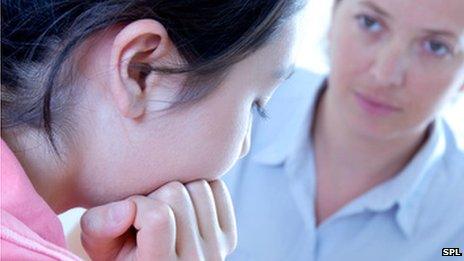Why are school nurses important?
- Published

School nurses were once seen simply as nit seekers, but children's safety and emotional wellbeing are now their primary concern.
The government has announced that children will help to train school nurses in how to provide the best support as part of a "strengthened and more tailored school nursing service".
Yet there are only 1,200 of them in England, and about 20,000 primary and secondary schools.
So why is their role still so important?
The poor health of army recruits in the 1890s is thought to have created the need for nurses to look after the health of children and young people.
In the early 1900s, these public health nurses were concerned with hygiene and the spread of disease, frequently dealing with outbreaks of flu and cholera.
White coats
The first school nurse worked in Bolton, caring for the poor in their own homes, and then in the 1960s and 70s school nurses began wearing white coats, answering to doctors and brandishing nit combs.
But the "Nitty Nora" image of school nurses combing through children's hair is one the profession has long been trying to shed.
"The role has always been about promoting public health with children and families," says Sharon White, professional officer with the School and Public Health Nurses Association (SAPHNA), which represents school nurses.
"But their work now covers around 50 different facets, ranging from acne to sexual exploitation, self harm to sleep problems - all those issues centred around the holistic health of children."
Team work
Immunising children, measuring their height and weight, running drop-in clinics and teaching part of the PSHE (personal, social and health education) curriculum are just a few more of the jobs they can be asked to do.
Depending on the needs of the local population, school nursing resources have to be focused on some areas more than others.
They do not work alone either. Qualified school nurses are part of a team of health professionals who help share the load.
"Sometimes the school nurse may seem invisible, but she is spending time on the neediest, complex families and on safeguarding issues," says Sharon White.
"And there's a difference between accessibility and invisibility."
School nurses say they have a unique position working with children aged from five to 19 years. They can have one-to-one conversations with them in a way that teachers often feel unable to do. They also offer greater confidentiality - and a link between home and school.
'Approachable'
Helen Ross is an executive board member of SAPHNA. She started school nursing in 1989 and has seen many changes since then.
She and her team now spend 70% of their time on trying to protect children, which she says is the right thing to do following the cases of Baby P and Victoria Climbie,
"School nurses are approachable and non-judgemental. We're in a position to be able to support young people - and they have a voice we must listen to."
The Department of Health's new vision for school nursing wants to take this further by making nurses more visible and more relevant.
It started with a promise last year to make it easier to contact school nurses, by texting them to make appointments. Now 300 young people will be chosen to help shape the services which school nurses provide.
Nurse numbers
Caroline Voogd, the editor of the British Journal of School Nursing, understands why this is important.
"Visibility has been poor. Involving young people ensures that they know the school nurse exists."
But it is still a small workforce. While there were 2,415 registered school nurses in England in 2008, according to the Nursing and Midwifery Council, numbers went down to 1,138 in May 2010 - then up again a little to 1,216 by the end of 2012.
Even if services are as made as efficient as possible, Voogd believes there should still be more qualified school nurses.
"You can increase performance and productivity but that only goes so far. School nurses can play a massive part in public health but there need to be more of them."
- Published17 February 2013
- Published12 March 2012